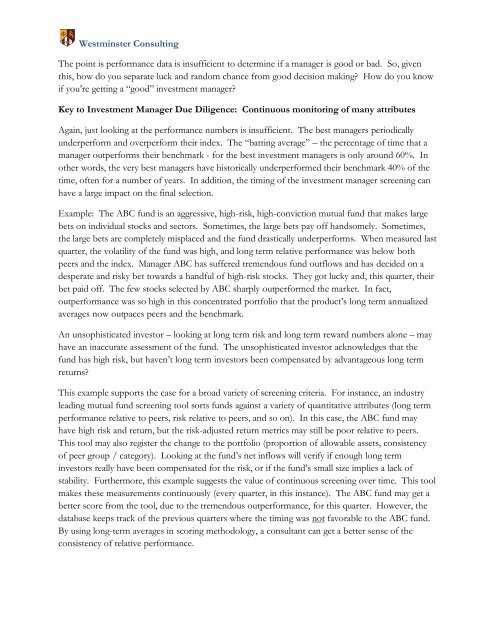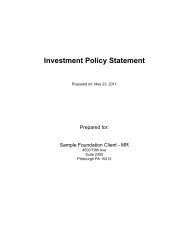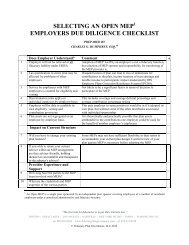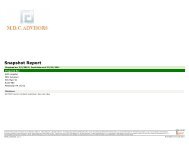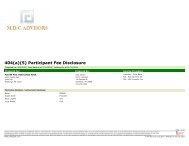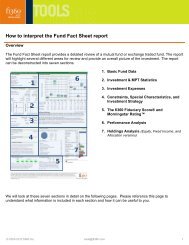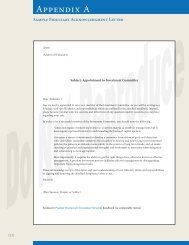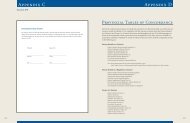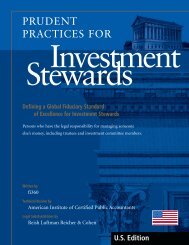and Investment Manager Due Diligence - Fi360
and Investment Manager Due Diligence - Fi360
and Investment Manager Due Diligence - Fi360
You also want an ePaper? Increase the reach of your titles
YUMPU automatically turns print PDFs into web optimized ePapers that Google loves.
Westminster Consulting<br />
The point is performance data is insufficient to determine if a manager is good or bad. So, given<br />
this, how do you separate luck <strong>and</strong> r<strong>and</strong>om chance from good decision making? How do you know<br />
if you’re getting a “good” investment manager?<br />
Key to <strong>Investment</strong> <strong>Manager</strong> <strong>Due</strong> <strong>Diligence</strong>: Continuous monitoring of many attributes<br />
Again, just looking at the performance numbers is insufficient. The best managers periodically<br />
underperform <strong>and</strong> overperform their index. The “batting average” – the percentage of time that a<br />
manager outperforms their benchmark - for the best investment managers is only around 60%. In<br />
other words, the very best managers have historically underperformed their benchmark 40% of the<br />
time, often for a number of years. In addition, the timing of the investment manager screening can<br />
have a large impact on the final selection.<br />
Example: The ABC fund is an aggressive, high-risk, high-conviction mutual fund that makes large<br />
bets on individual stocks <strong>and</strong> sectors. Sometimes, the large bets pay off h<strong>and</strong>somely. Sometimes,<br />
the large bets are completely misplaced <strong>and</strong> the fund drastically underperforms. When measured last<br />
quarter, the volatility of the fund was high, <strong>and</strong> long term relative performance was below both<br />
peers <strong>and</strong> the index. <strong>Manager</strong> ABC has suffered tremendous fund outflows <strong>and</strong> has decided on a<br />
desperate <strong>and</strong> risky bet towards a h<strong>and</strong>ful of high-risk stocks. They got lucky <strong>and</strong>, this quarter, their<br />
bet paid off. The few stocks selected by ABC sharply outperformed the market. In fact,<br />
outperformance was so high in this concentrated portfolio that the product’s long term annualized<br />
averages now outpaces peers <strong>and</strong> the benchmark.<br />
An unsophisticated investor – looking at long term risk <strong>and</strong> long term reward numbers alone – may<br />
have an inaccurate assessment of the fund. The unsophisticated investor acknowledges that the<br />
fund has high risk, but haven’t long term investors been compensated by advantageous long term<br />
returns?<br />
This example supports the case for a broad variety of screening criteria. For instance, an industry<br />
leading mutual fund screening tool sorts funds against a variety of quantitative attributes (long term<br />
performance relative to peers, risk relative to peers, <strong>and</strong> so on). In this case, the ABC fund may<br />
have high risk <strong>and</strong> return, but the risk-adjusted return metrics may still be poor relative to peers.<br />
This tool may also register the change to the portfolio (proportion of allowable assets, consistency<br />
of peer group / category). Looking at the fund’s net inflows will verify if enough long term<br />
investors really have been compensated for the risk, or if the fund’s small size implies a lack of<br />
stability. Furthermore, this example suggests the value of continuous screening over time. This tool<br />
makes these measurements continuously (every quarter, in this instance). The ABC fund may get a<br />
better score from the tool, due to the tremendous outperformance, for this quarter. However, the<br />
database keeps track of the previous quarters where the timing was not favorable to the ABC fund.<br />
By using long-term averages in scoring methodology, a consultant can get a better sense of the<br />
consistency of relative performance.


